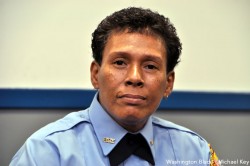Local
Police, fire officials meet community
Pledge of support after spate of anti-LGBT crimes
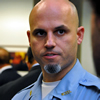
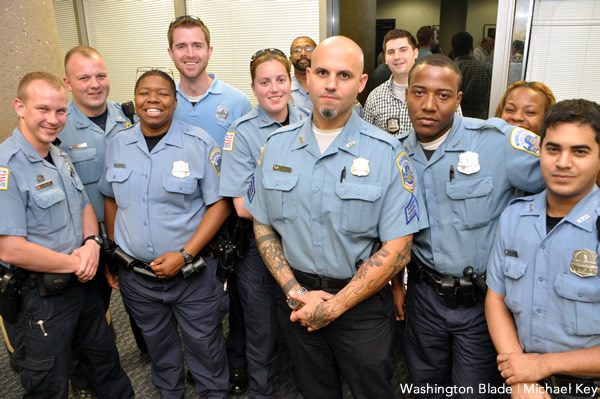
Members of the GLLU and affiliate officers joined fire and EMS officials in meeting the LGBT community at a public forum on Wednesday. (Blade photo by Michael Key)
More than a dozen affiliate members of the D.C. Police Department’s Gay and Lesbian Liaison Unit joined police and Fire and Emergency Medical Services Department officials Wednesday night for a Public Safety Open House for the LGBT community.
The event, organized by the Mayor’s Office of GLBT Affairs, gave activists and community members a chance to mingle with the GLLU’s full-time and affiliate officers before the start of a discussion, where police and Fire Department officials answered questions about community concerns.
Activists attending the open house at the city’s Reeves Municipal Building at 14th and U streets, N.W., praised police and fire officials for establishing policies calling for reaching out to the LGBT community and prohibiting anti-LGBT discrimination against police officers, firefighters and EMS workers as well as against members of the public.
But several attendees, including transgender activists Ruby Corado and Jason Terry and gay activist Rick Rosendall, said the supportive actions and attitudes of high-level police officials often don’t filter down to the behavior and actions of rank and file officers.
They pointed to a number of recent incidents involving police officers that have shaken the LGBT community. In one case, several officers refused to take a report of an incident in which four lesbians were assaulted by two male attackers who called them anti-gay names. The incident occurred outside the Columbia Heights Metro station.
D.C. Police Chief Cathy Lanier said the incident is under investigation and the officers could be fired depending on the findings of the investigation.
In another incident that shocked LGBT activists, an off-duty D.C. police officer fired his service revolver at three transgender women and two male friends who were sitting in a car in Northwest D.C. Two of the women and one of the men suffered non-life-threatening gunshot wounds. The officer was arrested and charged with assault with a dangerous weapon.
Transgender activist Jeri Hughes said at the open house that police have not adequately investigated other assaults against transgender women, including one recent case where a trans woman was attacked on a Metro Bus.
Hughes said that while the rate of closing homicide cases in D.C. by making an arrest is 80 percent, the rate of solving homicides involving transgender victims is 20 percent.
On hand to answer questions about these and other concerns were Paul Quander, the D.C. Deputy Mayor for Public Safety, who oversees the Police and Fire and EMS departments; D.C. Fire Chief Kenneth Ellerbe; Deborah Hassan, an EMS technician who serves as the Fire and EMS Department’s LGBT community liaison; Capt. Edward Delgado, director Police Department Special Liaison Division, which oversees the GLLU; and Sgt. Carlos Mejia, supervisor of the GLLU.
Also speaking at the event was Melissa Hook, director of the city’s Office of Victim Services, which assists crime victims.
Quander opened the discussion by inviting the LGBT community to inform him about issues of interest.
“I work for you,” he said. “I work for the citizens of the District of Columbia. And I need to meet your needs. I need to know what your issues are…and I have to ensure that everyone is treated equally, that everyone has a voice.”
With D.C. gay activist Peter Rosenstein serving as moderator, several LGBT activists responded by reiterating what they said were longstanding concerns. Among them is the view that Lanier weakened the GLLU by reducing the number of officers at its headquarters office, making it less responsive to the community at a time when anti-LGBT hate crimes are on the rise.
Lanier has said a police funding reduction made it necessary to reduce the GLLU headquarters staff from seven officers and a full-time sergeant to four officers and a part-time sergeant. But she has said the affiliate GLLU officer program she started has resulted in the designation of 46 GLLU affiliate officers, who work out of each of the department’s seven police districts. According to Lanier, the affiliates have greatly expanded the reach of the GLLU, enabling it to respond to all sections of the city at all times of the day and night.
Most LGBT activists and the local group Gays and Lesbians Opposing Violence say they support the affiliate program but believe the direction and leadership of the GLLU must be set by the full-time officers working out of the unit’s headquarters, which is located in Dupont Circle.
Under Lanier’s officer affiliate program, the affiliate members of the GLLU and separate liaison units working with the Latino, Asian, and deaf and hard of hearing communities devote most of their time to their regular patrol duties in the police district to which they are assigned. Upon receiving special training for liaison unit duties, the affiliates are on call to respond to LGBT-related crimes in their respective districts.
Mejia serves as supervisor of the GLLU and the Latino Liaison Unit. Although activists have praised his work in managing the GLLU they say the unit’s effectiveness is diminished by not having a full-time supervisor.
Hassan, the Fire and EMS Department’s LGBT liaison, is less known in the LGBT community than GLLU officers.
In an interview before the start of the open house forum, she told the Blade that all firefighters and EMS workers receive diversity training that includes information about the LGBT community. She said she is unaware of any recent complaints by members of the LGBT community about discriminatory treatment by firefighters or EMS workers.
Hassan said she is out as a lesbian at work. She noted that at her request, she was given an official name badge for her uniform that identifies her as an EMS worker and “LGBT Liaison.”
“We’re here for the community, whether you’re straight or gay,” she said during the open house discussion.
Rosenstein, in introducing Delgado at the open house, said he was pleased that Delgado returned to his job as director of the Special Liaison Division. Rosenstein was referring to a decision by Chief Lanier earlier this year to transfer Delgado to another division and replace him at the liaison division post with a civilian police official who had no direct experience in police work such as investigating crimes.
Some activists criticized Lanier for making the change, saying Delgado had worked well with the LGBT community and appeared more knowledgeable on issues likely to come up in the operation of the Special Liaison Division.
“I’m not going to sit here and say we’ve done everything correctly because we’re all human and we all have faults,” Delgado said. “But you can rest assured that the Metropolitan Police Department stands behind the members of the LGBT community because we actually believe that all members of the community should be protected.”
Jeffrey Richardson, director of the Office of GLBT Affairs, said his office plans to hold more public safety open house events for the LGBT community in the future. He and Rosenstein thanked the GLLU officers for attending the event, including those who came during their off-duty hours.
Richardson noted that the names of all affiliate GLLU officers are posted on the Police Department website on the GLLU page. The listing includes e-mail contact information for each of the officers and shows the police district to which they are assigned, enabling members of the LGBT community to identify the GLLU affiliate officer serving the area where they live.
Maryland
Silver Spring holds annual Pride In The Plaza
‘Today means inclusion. It means to build resilience’

Silver Spring’s annual Pride in the Plaza event took place on Sunday to celebrate the LGBTQ community and emphasize inclusion and resilience.
“Today means inclusion. It means to build resilience, love,” Robyn Woods, program and outreach director for Live In Your Truth, which organized the event, said. “I mean, just being surrounded by the community and so many great entrepreneurs, business owners, and just being a part of this whole rainbow coalition that we call the LGBTQIA to be about.”
With the event being her first time organizing for Live In Your Truth, Woods said she felt emotional to see the support and love at the event.
“Some people (are) bringing out their children, their babies, their grandparents,” Woods said. “It’s a lot more allies here than anything else. That type of support to me means so much more than just support from my community; just outside support, inside support, so much support around it, so much love. Everyone’s smiling outside, helping each other.”
Attendees of the event were able to head over to the Family Fun Zone, an air-conditioned Pride Cool Down Lounge, or watch live drag performances in the main stage area.
Along with entertainment and a shaved-ice stand, rows of information tables stood along the plaza, including FreeState Justice, the Washington Spirit, Trans Maryland, Moco Pride Center, and the Heartwood Program, an organization that offers support, therapy, education, and resources to the LGBTQ community.
“I want people to know about our services, and I love what we have to offer,” Jessica Simon, psychotherapist for Heartwood Program’s Gender Wellness Clinic, said. “I (also) want to be part of a celebration with the community, and so it feels good to be here with other people who have something they want to give to the community.”
She added that within today’s political climate, to which she called an “antidote to shame,” it’s important to be celebrating Pride.
“There’s a lot of demonization of LGBTQI people,” Siena Iacuvazzi, facilitator for Maryland Trans Unity, said. “(Pride) is part of the healing process.”
Iacuvazzi said she was taught to be ashamed of who she was growing up, but being a part of a community helped her flourish in the future.
“I was taught how to hate myself. I was taught that I was an abomination to God,” she said. “But being a community is like understanding that there are people who have experienced the same thing, and they’re flourishing. They’re flourishing because they’re willing to stand up for themselves as human beings and discover themselves and understand what’s true for themselves.”
She added that Pride allows for a mutual understanding to take place.
“It’s more of a sense of belonging … and just taking that home and understanding you’re not alone,” Iacuvazzi said. “We’re each taking our own journey — we’re not putting that on each other. It’s just walking away with a sense of belonging and humanity.”
Similar to Iacuvazzi, Woods said she hopes attendees’ biggest takeaways would be family, fun, resilience, and pride.
“Being proud of yourself, being happy for who you are, and representation and how much it matters,” she continued. “And I think all these young people that are walking around here get to see versions of themselves, but older. They get to see so many different lesbian, gay, bisexual, pansexual people that are successful, that are showing love, that care, and it’s not how we’re portrayed in the media. It’s lovely to see it out here. (It’s) like we’re one big old, happy family.”
Virginia
Spanberger touts equality, reproductive rights in Arlington
Democratic Va. gubernatorial nominee made campaign stop at Freddie’s Beach Bar
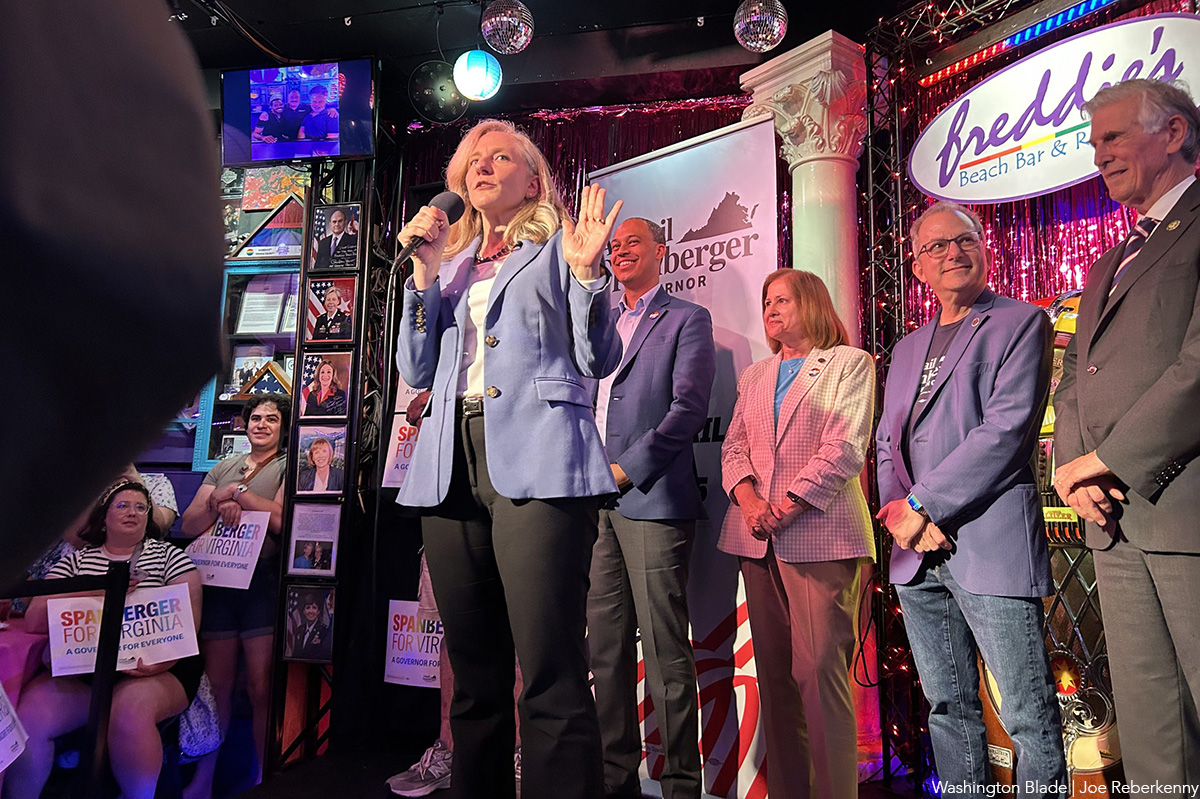
With the general election heating up and LGBTQ rights under increasing threat nationwide, Virginia gubernatorial candidate Abigail Spanberger brought her “Span Virginia Bus Tour” to Arlington’s Freddie’s Beach Bar for a campaign stop filled with cheers, policy pledges, and community spirit.
Spanberger, who served three terms in the U.S. House of Representatives from 2019 through early 2025 for Virginia’s 7th Congressional District, also served as a federal law enforcement officer specializing in narcotics and money laundering cases, and as a CIA case officer working on counterterrorism and nuclear counterproliferation.
Spanberger is running against Republican nominee Winsome Earle-Sears, the current lieutenant governor of Virginia, who said she was “morally opposed” to a bill protecting marriage equality in the commonwealth.
She was joined by other Democratic candidates and supporters: lieutenant gubernatorial candidate Ghazala Hashmi, attorney general candidate Jay Jones, Virginia state Sen. Adam Ebbin (D-Alexandria), and Congressman Don Beyer.
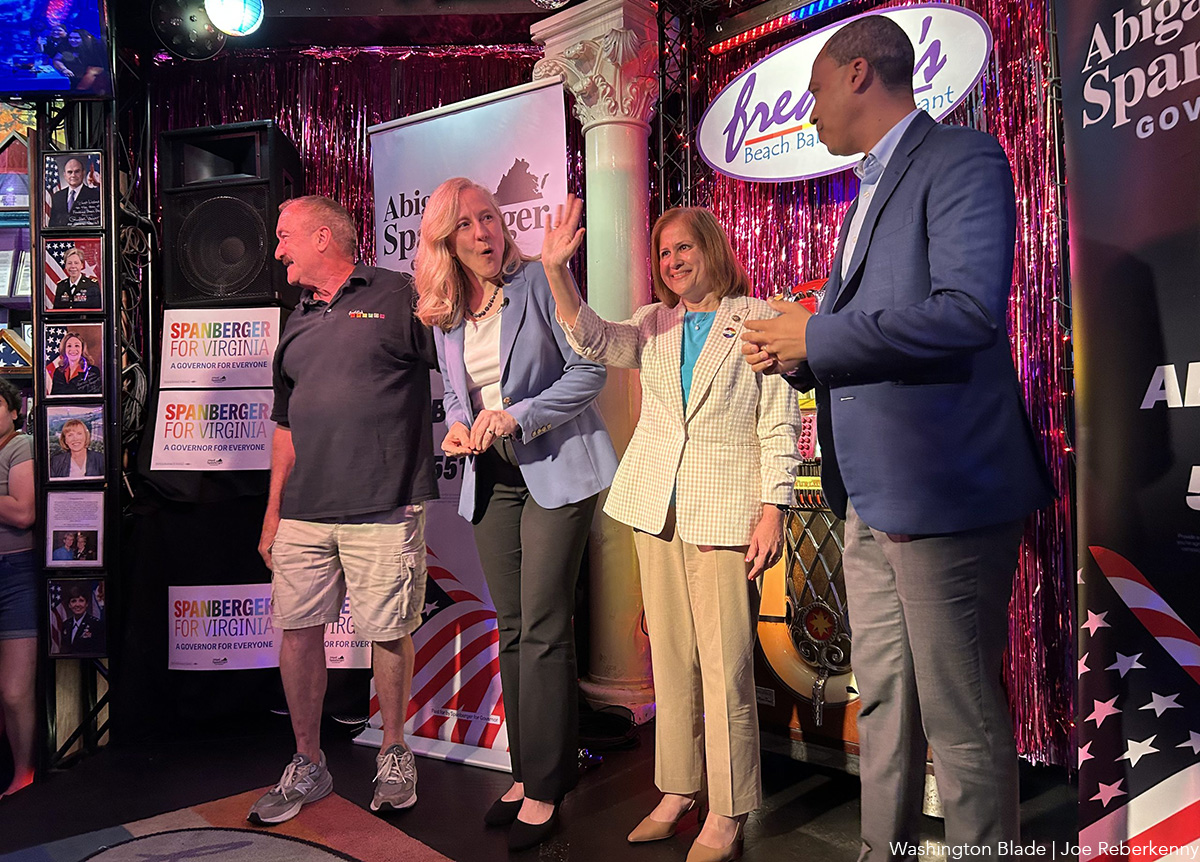
Freddie’s was packed wall-to-wall with supporters, many of whom wore “Spanberger for Virginia” shirts in the progressive Pride flag colors. In her speech, she made it clear that LGBTQ Virginians’ rights are on the ballot this year.
“I’m so excited to be here, and I am so grateful to the entire staff of Freddy’s for letting us overtake this incredible venue that is not just an awesome place to come together in community, but is a symbol to so many people of joy, of happiness, of community and of celebrating our friends and our neighbors,” Spanberger told the packed restaurant. “It is exciting to be here, and particularly during this Pride month, and particularly as we reflect on the 10-year anniversary of Obergefell and the reality that we still have so much work to do.”
“The reality is there are so many people who still would be inclined to take us backwards,” she said. “In this moment when we see attacks on people’s rights, on people’s humanity, on Virginia, on our economy, on research, on public education, on food security, on health care, on Virginians, on their jobs, on public service and on people — it can get heavy.”
“What it does for me is it makes me want to double down, because once upon a time, when I was talking to my mother about some horror show or sequence of activities coming out of a particular administration, she did not really have the patience to listen to me and said ‘Abigail, let your rage fuel you’ — and the conversation was over. And so I reflect on that, because, in fact, every day there is so much fuel to be had in this world and in this moment.”
One of the points Spanberger continued to emphasize was the importance of steadfast state government officials following the election of President Donald Trump, which has led to rollbacks of LGBTQ and bodily autonomy rights as a result of the conservative-majority U.S. Supreme Court.
“What the past few years have shown us is that a Supreme Court decision, no matter how many years we have celebrated its existence, does not protect us in the long term. And so as governor, I will work to make sure that every protection we can put in place for the dignity, the value, and the equal rights of all Virginians is a priority.”
During her speech, Spanberger highlighted several of the key values driving her campaign — protecting reproductive freedom and human rights, lowering healthcare costs, safeguarding Virginia’s environment, and ensuring that public education is affordable, accessible, and rooted in truth, not politics.
Spanberger went as far as to say that she wants to amend the state’s constitution to remove Section 15-A. “The reality is that in Virginia, we still have a ban in our state constitution on marriage equality. It is of the utmost urgency that we move forward with our constitutional amendment.”
“We will work to ensure that that terrible constitutional amendment, that was put in years ago, is taken out and updated and ensuring that Virginia is reflective in our most essential documents of who we are as a commonwealth, which is an accepting place that celebrates the vibrancy of every single person and recognizes that all Virginians have a place, both in that constitution and in law,” she added.
Following the event, two supporters spoke to the Washington Blade about why they had come out to support Spanberger.
“I came out because I needed to show support for this ticket, because it has been a particularly rough week, but a long few years for our rights in this country, in this state, with this governor, and it’s — we need to flip it around, because queer people need protection,” said Samantha Perez, who lives in Ballston. “Trans people need protection. Trans kids need protection. And it’s not gonna happen with who’s in Richmond right now, and we just need to get it turned around.”
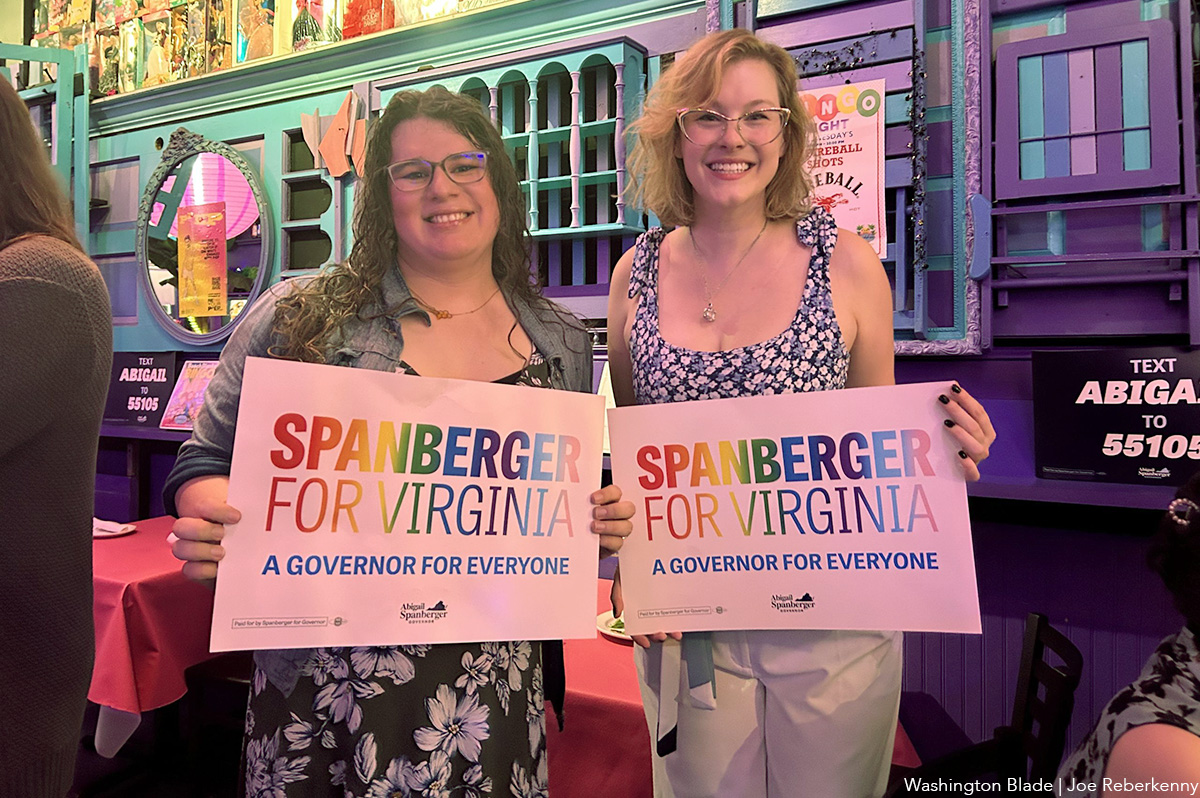
“The whole neighborhood’s here. All our friends are here,” said Annie Styles of Pentagon City. “It means the world to me to take care of each other. That’s what a good community does. That’s not what we’ve had with the Republicans here or across the nation for a really long time. It’s time to show that care. It’s time to make sure that good people are in a position to do good things.”
District of Columbia
Activists protest outside Hungarian Embassy in DC
Budapest Pride scheduled to take place Saturday, despite ban

More than two dozen activists gathered in front of the Hungarian Embassy in D.C. on Friday to protest the country’s ban on Budapest Pride and other LGBTQ-specific events.
Amnesty International USA Executive Director Paul O’Brien read a letter that Dávid Vig, executive director of Amnesty International Hungary, wrote.
“For 30 years Budapest Pride has been a celebration of hope, courage, and love,” said Vig in the letter that O’Brien read. “Each march through the streets of Budapest has been a powerful testament to the resilience of those who dare to demand equality, but a new law threatens to erase Pride and silence everyone who demands equal rights for LGBTI people.”
“The Hungarian government’s relentless campaign against LGBTI rights represents a worrying trend that can spread normalizing division and hatred,” added Vig. “Thank you for standing with us when we refuse to be intimidated.”
Council for Global Equality Chair Mark Bromley and two of his colleagues — Stephen Leonelli and Keifer Buckingham — also spoke. Health GAP Executive Director Asia Russell and Chloe Schwenke, a political appointee in the Obama-Biden administration who worked for the U.S. Agency for International Development, and Planned Parenthood staffers are among those who attended the protest.
(Washington Blade video by Michael K. Lavers)
Hungarian lawmakers in March passed a bill that bans Pride events and allow authorities to use facial recognition technology to identify those who participate in them. MPs in April amended the Hungarian constitution to ban public LGBTQ events.
Budapest Pride is scheduled to take place on Saturday, despite the ban. Hundreds of European lawmakers are expected to participate.
“Sending strength to the patriotic Hungarians marching tomorrow to advance human dignity and fundamental rights in a country they love,” said David Pressman, the gay former U.S. Ambassador to Hungary, on Friday on social media.
Sending strength to the patriotic Hungarians marching tomorrow to advance human dignity and fundamental rights in a country they love. Szabadság és szerelem. My past remarks on Budapest Pride: https://t.co/y1QhA9QouA
— David Pressman (@AmbPressman) June 27, 2025
-

 U.S. Supreme Court4 days ago
U.S. Supreme Court4 days agoSupreme Court upholds ACA rule that makes PrEP, other preventative care free
-

 U.S. Supreme Court4 days ago
U.S. Supreme Court4 days agoSupreme Court rules parents must have option to opt children out of LGBTQ-specific lessons
-

 National5 days ago
National5 days agoEvan Wolfson on the 10-year legacy of marriage equality
-

 Congress5 days ago
Congress5 days agoSenate parliamentarian orders removal of gender-affirming care ban from GOP reconciliation bill

